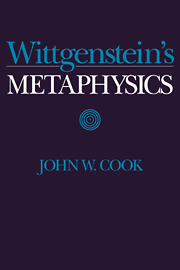Book contents
- Frontmatter
- Contents
- Preface
- List of Abbreviations
- Introduction
- Part I From Idealism to Pure Realism
- 1 Wittgenstein's Philosophical Beginnings
- 2 Neutral Monism
- 3 The ‘Objects’ of the Tractatus
- 4 The Essence of the World Can Be Shown But Not Said
- 5 What the Solipsist Means is Quite Correct
- 6 Pure Realism and The Elimination of Private Objects
- Part II The Metaphysics of Wittgenstein's Later Philosophy
- Part III Causation and Science in a Phenomenal World
- Part IV Logical Possibilities and the Possibility of Knowledge
- Part V The Past, Memory, and The Private Language Argument
- Name Index
- Subject Index
- Frontmatter
- Contents
- Preface
- List of Abbreviations
- Introduction
- Part I From Idealism to Pure Realism
- 1 Wittgenstein's Philosophical Beginnings
- 2 Neutral Monism
- 3 The ‘Objects’ of the Tractatus
- 4 The Essence of the World Can Be Shown But Not Said
- 5 What the Solipsist Means is Quite Correct
- 6 Pure Realism and The Elimination of Private Objects
- Part II The Metaphysics of Wittgenstein's Later Philosophy
- Part III Causation and Science in a Phenomenal World
- Part IV Logical Possibilities and the Possibility of Knowledge
- Part V The Past, Memory, and The Private Language Argument
- Name Index
- Subject Index
Summary
By 1911, when Wittgenstein arrived in Cambridge, neutral monism was becoming a widely shared view. Among its advocates were Ernst Mach, William James, Karl Pearson, and the American new realists. Russell, too, was greatly interested in neutral monism and discussed it at length in several articles published between 1912 and 1914, although he did not fully embrace the view until 1921. Wittgenstein did not await Russell's approval: by 1916 he had made up his mind that neutral monism provides the way out of philosophical difficulties. This is the single most important fact to be known about Wittgenstein's views, for if one fails to take it into account, one is bound to misunderstand him completely.
The great attraction of neutral monism was that it appeared to offer an escape from the problems generated by dualism. W. T. Stace nicely summarizes the matter as follows:
Neutral monism appears to be inspired by two main motives. The first is to get rid of the psycho-physical dualism which has troubled philosophy since the time of Descartes. The second motive is empiricism. The “stuff” of the neutral monists is never any kind of hidden unperceivable “substance” or Ding-an-sich. It is never something which lies behind the phenomenal world, out of sight. It always, in every version of it, consists in some sort of directly perceivable entities – for instance, sensations, sense-data, colours, smells, sounds. […]
- Type
- Chapter
- Information
- Wittgenstein's Metaphysics , pp. 14 - 30Publisher: Cambridge University PressPrint publication year: 1994



